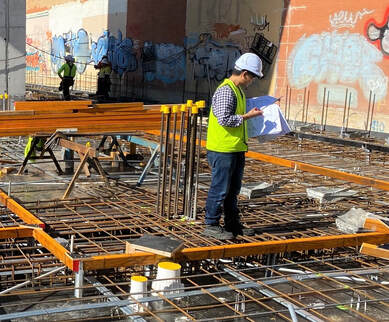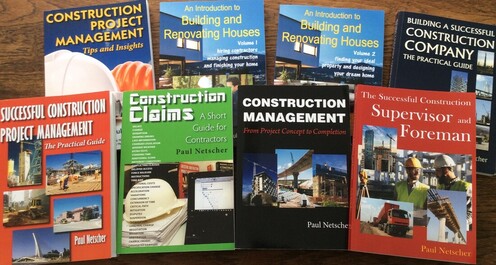"Whenever a construction project goes wrong the blame is often put to bad luck. Construction Project Managers and contractors in general must be some of the most optimistic people on earth. It won’t rain during the construction project, construction materials will arrive on time, equipment won’t break down, our teams will produce the production expected of them for the full duration of their shift, construction drawings will arrive timeously, subcontractors will produce their part of the construction project on time, and so it goes on. Indeed I think only farmers could be a more optimistic bunch, depending almost entirely on the vagaries of the weather and believing it will rain at the right time, never too little or too much. Certainly whenever a construction project goes wrong the blame is often put to bad luck. If only we hadn’t had that storm just then, if only the subcontractor had delivered what they promised, if only the client had been more accommodating, why did the workers have to walk off the project, with just a little luck we could have finished the construction project on time and made the millions we thought we would. "Yet some problems on construction projects could have been foreseen." Yet some of these problems could have been foreseen, and either avoided or mitigated. So how can we take control of our construction projects, leaving less to luck and chance, and engineer our project’s successful destiny? #constructionproblems #constructionmanagement #contractors Avoiding problems on construction projects Image by Maciej Cieslak from Pixabay Image by Maciej Cieslak from Pixabay The more we plan the luckier we get A good golfer said the more he practiced the luckier he got. Well in construction the more we plan the luckier we get. Thinking through our method of construction, allowing for access, selecting the best subcontractors, preparing a suitable construction schedule (programme), arranging the appropriate resources and timeously ordering the correct construction materials will all help prevent crises later in the project. How many construction projects are disrupted by the weather, yet, some of the problems could have been foreseen and avoided by completing weather dependent tasks ahead of the rainy, windy or cold seasons? Good planning can, and will help you avoid many problems, making you lucky, and your construction project successful. "Preventing a fire is often much easier than extinguishing a blazing inferno." Are you a firefighter or a fire prevention officer? I have worked with Construction Project Managers who could literally solve any problem. In fact, to be with them was exhausting, as they were continually solving problems – phone glued to their ears as they frantically made calls; cajoling, begging and persuading suppliers, contractors and Supervisors to urgently deliver missing material, complete a task or get more resources onto the project. Why were they faced with these multiple emergencies – well someone hadn’t ordered materials, the construction schedule was slipping, there were insufficient resources, etc, etc. Why had this happened, well because the Project Manager was so busy solving problems that they had forgotten, or simply run out of time! Yet, I’ve been on other well managed construction sites where it seemed that the Project Manager was hardly doing anything – no shouting, no frantic phone calls. Everything seemed to be running like clockwork. Preventing a problem from arising on a construction project often takes much less time than solving the problem should it arise. Preventing a fire is often much easier than extinguishing a blazing inferno. Employ the right team Most construction projects are built by a team. Selecting the right team for your project is essential. It doesn’t have to be the best team – because even good people often have failings, and may not be right for a particular project, client or team. You need people you can depend on to deliver a quality project on time and safely. #constructionpeople #constructionprofessionals "Even the best people need direction." Direct your team But even with the right people you still need to give them direction. They need to know what their responsibilities are, and what their limits of authority are. They need to understand the construction project requirements, the construction schedule and specifications are. You need to delegate, but also monitor what they are doing. One small task missed or left undone can lead to untold problems. Think of that long lead item not ordered or reinforcing that wasn’t checked before concreting which could spell disaster. Understand your team The few construction projects I had go wrong were when I was working with a new team. I didn’t understand their weaknesses and depended on them to complete a task or manage the construction project only to later find they weren’t capable, or didn’t have the knowledge. By using the strengths of your team and supporting their weaknesses, teaching and mentoring them where necessary, it will be possible to prevent mistakes happening. Forewarned is forearmed It’s important to keep your ear to the ground, talk to those who have local knowledge, read the newspapers, and talk to your crew. Locals may have a better understanding of the local weather patterns, flood lines, traffic, existing services and local conditions. They may provide valuable contacts, inside to the local politics, what to do and what you shouldn’t do. Keeping up with the news could give forewarnings of clients, contractors or suppliers facing financial problems. It’s amazing what your crew sees and knows and they often have the lowdown on potential trouble long before you. Of course don’t believe everything you read and hear, and do your own investigation before accepting it’s true. Understand the risks Unfortunately many contractors start a construction project without fully understanding the risks. By understanding the risks you can take preventative actions which can either prevent the risk from eventuating, or if it does ensure that the extent is mitigated so the project isn’t overwhelmed. It’s good practice to prepare a risk schedule when you price the project, update this before you start and then monitor and update the schedule as the construction project progresses. Of course ensure your team is also aware of the risks and understand what actions need to be taken to mitigate the potential risks. Risks must be managed. Collect the correct data and use it wisely Data is king – but only if it is correct and is used wisely. I have worked for contractors that have produced monthly reports of a hundred pages, yet some of the data was suspect, some was fudged to present the best result to management and much of it was ignored or misinterpreted. There is much valuable data that can be collected on construction projects, starting with a correctly updated construction schedule. But often the schedule isn’t correct in the first place, if it is it’s not updated correctly, and if it is sometimes the update is ignored or the wrong actions are taken to correct slippage. Collect the right data, ensure it is accurate and current, and then interpret it correctly using it to catch problems timeously and take remedial action. "Don't be so focussed on the details that you miss the train about to run you over. But also don't trip over a missing detail." Keep an eye on the big picture but don’t forget the details Some Construction Project Managers slip on the details, only focussing on the big picture. Details are important and it’s often the tiniest details overlooked which result in mega problems. Then there are some Project Managers who are so focussed on the details that they fail to see the train that’s about to run them down. Ask questions When in doubt ask a question. If the information isn’t clear seek clarity. Too many mistakes are made because we assumed something or misunderstood the information. Questions also act as reminders to others ensuring that tasks don’t get forgotten or slip through the cracks. I probably irritated my teams by always asking if they had completed a task, ordered an item or taken note of a potential problem. Better a little irritation than a delay caused by a missed task. "Small actions can often save a great deal of pain." Sometimes small actions can save you future problems We all take shortcuts at some stage, some can save valuable time and costs, but many are just laziness on our part and haven’t been well thought through. Small actions can often save us a great deal of pain – think of creating a berm around excavations to keep stormwater out, keeping stormwater drains clean, providing sufficient lighting, ensuring the worksite has safe access or stopping an unsafe act can all appear an inconvenience or cost, but often the minor extra cost and inconvenience will be far less than the costs of a flooded worksite or an accident. Check, check and check again The saying goes measure twice and cut once. How often have we all been tripped up by errors; where buildings have been set out incorrectly, materials have been under ordered or over ordered and items have been fabricated to the wrong size or specification. Spend a little extra time to ensure what you have ordered or measured is correct. You can avoid many potential problems on your construction projectUnfortunately problems will and do occur in construction and I will discuss pre-empting and dealing with these in a future article. However, with good planning, the right team and sound project management skills many of these problems can be avoided. View similar articles by the Author – visit the index of construction articles on this website This article is adapted from the author's books. To read more about these books and find out where you can purchase them visit the pages on this website by clicking the links below: 'Successful Construction Project Management: The Practical Guide' 'Building a Successful Construction Company: The Practical Guide' "I highly recommend this book be read by all newly qualified construction project managers as well as those more experienced." (Reader 1 - Amazon.co.uk) Paul Netscher has written several easy to read books for owners, contractors, construction managers, construction supervisors and foremen. They cover all aspects of construction management and are filled with tips and insights.
Visit to read more. The books are available in paper and ebook from most online stores including Amazon. © 2015 This article is not to be reproduced for commercial purposes without written permission from the author. construction management construction project management
1 Comment
|
Archives
June 2024
Note: We welcome genuine comments, especially comments that add additional information to the subject matter in the article. We however reserve the right to remove inappropriate comments, which includes comments that have nothing to do with the subject, comments that include inappropriate language, and comments that are an advertisement for a product or company, or which include an advertising link. Comments must be in English. We will not enter into discussion on why a particular comment was removed.
CategoriesCopyright 2016 - The attached articles cannot be reproduced for commercial purposes without the consent of the author.
The opinions expressed in the attached articles are those of the writer. It should be noted that projects are varied and different laws and restrictions apply which depend on the location of the contractor and the project. It's important that the reader uses the supplied information taking cognisance of their particular circumstances. The writer assumes no responsibility or liability for any loss of any kind arising from the reader using the information or advice contained herein. "I have what I consider some of the best books on construction management."
Books are available from: Amazon.com Amazon.co.uk takealot.com kalahari.com Amazon.in Amazon.de Amazon.fr Amazon.it Amazon.com.au Powell's Fishpond uread bokus Amazon.ca Amazon.es Other retail stores Available in paperback or on Kindle "28 YEARS OF CONSTRUCTION PROJECT MANAGEMENT EXPERIENCE, DEVELOPING SUCCESSFUL CONSTRUCTION PROJECT MANAGERS AND BUILDING SUCCESSFUL CONSTRUCTION COMPANIES"
|







 RSS Feed
RSS Feed




